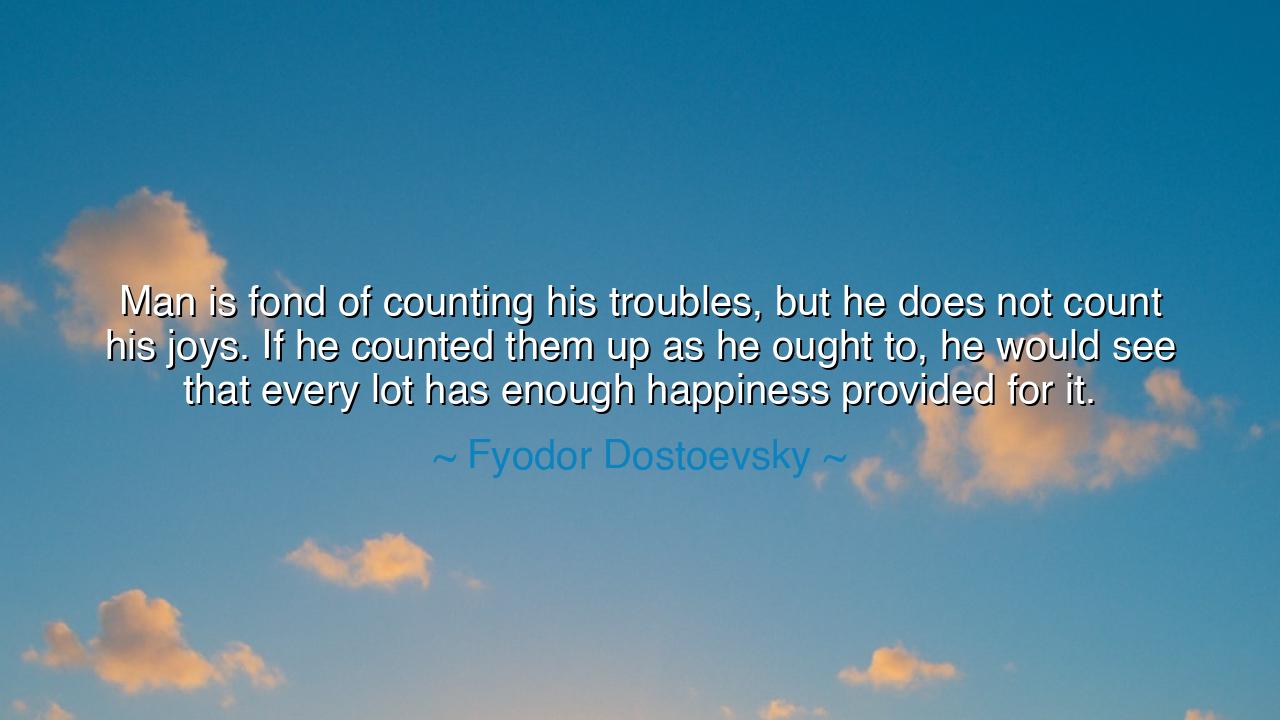
Man is fond of counting his troubles, but he does not count his
Man is fond of counting his troubles, but he does not count his joys. If he counted them up as he ought to, he would see that every lot has enough happiness provided for it.






“Man is fond of counting his troubles, but he does not count his joys. If he counted them up as he ought to, he would see that every lot has enough happiness provided for it.” Thus wrote Fyodor Dostoevsky, the great Russian soul-seer, whose pen revealed the hidden struggles of the human heart. In this saying lies a timeless truth: that man, though surrounded by blessings, is often blind to them. He tallies his sorrows like coins of a cursed treasury, while his joys, bright and abundant, pass unnoticed. Dostoevsky, who himself endured suffering that would have broken lesser spirits, understood that happiness is not absent from life — it is only obscured by the shadows of our own attention.
The origin of this quote rests in the very crucible of Dostoevsky’s life. Arrested for political dissent in his youth, condemned to death, he stood before a firing squad — only to be spared at the last instant by a Tsar’s decree. Exiled to Siberia for years of brutal labor, stripped of status and comfort, he came to know the depths of despair. Yet in that wasteland, among prisoners and snow, he found a strange illumination: that even in misery, there are glimmers of grace — a sunrise, a kind word, a memory, a moment of laughter. From this awakening was born his belief that life, in every condition, holds enough happiness for those who learn to see it. His words, therefore, are not the easy consolation of one untouched by pain, but the hard-won wisdom of a man who saw light through the deepest darkness.
Man is fond of counting his troubles. This is the weakness of the human heart — to cling to pain, to turn it over in the mind until it grows larger than life itself. Trouble gives us a sense of identity; it feeds our pride and our pity. Yet while we count our wounds, we forget our healings. We measure our losses but ignore the gifts that remain. We see the rain and not the harvest, the night but not the stars. Dostoevsky warns us that this blindness leads to despair, for one who forever tallies sorrow will always believe himself poor. But to count one’s joys, to name them one by one — this is the secret alchemy that turns bitterness to gratitude and transforms the soul’s poverty into wealth.
Consider the story of Helen Keller, born both blind and deaf, cut off from the sounds and sights of the world. By reason’s measure, her life should have been an endless prison of isolation. Yet guided by her teacher, she discovered language, and through it, wonder. She once wrote, “So much has been given to me, I have no time to ponder that which has been denied.” This is Dostoevsky’s wisdom made flesh. Though deprived of what most would call essential, she learned to count her joys — the touch of a hand, the warmth of sunlight, the company of those who loved her. Her life became a hymn of gratitude, proof that happiness is not given by circumstance, but born within perception.
Dostoevsky’s insight also holds a quiet warning: that complaint is easy, but gratitude is strength. The human mind, drawn toward pain as the moth to the flame, must be trained to see the good that quietly surrounds it. Happiness is not the absence of trouble, but the balance between shadow and light. Every life has its share of both. If we dwell only on hardship, even paradise would seem barren; but if we learn to see beauty even in hardship, we shall find paradise everywhere. This is the spiritual discipline Dostoevsky speaks of — the counting not of misfortunes, but of mercies.
And what, then, is the lesson for us, the heirs of his wisdom? It is to awaken to the abundance already present in our days. To rise in the morning and give thanks not for perfection, but for breath. To see in the faces of loved ones not routine, but miracle. To walk through sorrow without letting it define us. To count our joys as deliberately as we have counted our troubles, until gratitude reshapes our vision. For the one who learns to count rightly will see that happiness has always been there — modest, patient, waiting to be noticed.
So, dear listener, when next your heart is heavy, remember the words of Dostoevsky. Set down the stones of sorrow you have been carrying. Lift your gaze to the quiet blessings that still remain — the light in the window, the laughter of a friend, the courage to go on. Know that in every life, no matter how burdened, there lies enough happiness provided for it. You need not seek it far; you need only count it. For happiness, once recognized, multiplies — and the soul that learns gratitude discovers that even in this imperfect world, there is more joy than the heart can hold.






AAdministratorAdministrator
Welcome, honored guests. Please leave a comment, we will respond soon